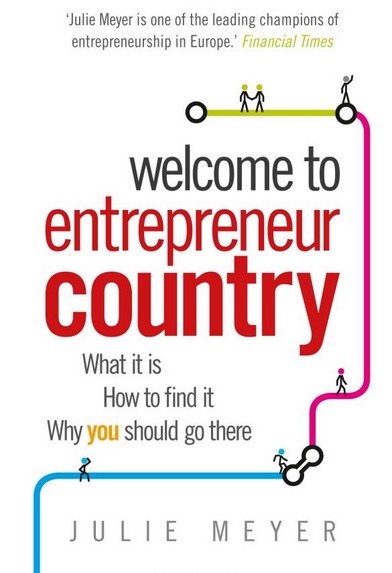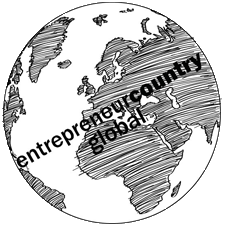Welcome to entrepreneurcountry
Welcome to entrepreneurcountry - What it is, How to find it, Why you should go there written by Julie Meyer and published by Constable Robinson and a Top 20 Business Book at WHSmith in the UK, describes the essence of the new social contract that is emerging.
A structural change is happening akin to the shift from horses to cars, and the winners are those who get to the other side first.
Julie's thesis is that prosperity is driven by harmonious interdependence, and the enemies of that are bankers and industrialists who don't care about outcomes (hyper independence), a state which infantalises its people (feudalism), and individuals who argue for their limitations and seek dependence.
Her own backstory is used as a narrative for describing how entrepreneurs "go to a different country everyday". Julie also describes how she slowly came to the realisation through the financial crisis that we are all going to that same country - entrepreneurcountry. The country operates around a set of economics driven not just by technology but by alignment of forces. Goliath enterprises should use their distribution and customer base as a highway for the new "digital David's" who are building the cars of the new era. "Ecosystem Economics" is the new industrial paradigm.
Individual Capitalism is coming to the fore; the unit of trading has shifted from business to the individual capitalist. People in their twenties think of themselves as their own P&L and their own brand. Their parents, who have been laid off or have left their corporate jobs, don't want to go back.
Meyer's view is that women are uniquely positioned in a world of networks to lead. The qualities traditionally referred to as feminine leadership traits - group collaboration, trust-based management, transparency - are not only preferable, but they are necessary where hierarchy has been usurped by multi-stakeholder networks. We live in a carrot world; sticks don't work (anymore).
Welcome to entrepreneurcountry offers a way out of the downward spiral that covers our papers from crisis to crisis. It is only by challenging each individual to find and make their unique contribution to the world that we work our way out of the moral bankruptcy, depleting sense of confidence and shrinking economy. Leaders are people who care about things beyond themselves, beyond money, beyond their narrow self-interest.
The book's influences are as vastly different as the Venezuelan economist Carlota Perez, the Russian philosopher Ayn Rand, the technology marketeer Geoff Moore, Stephen Covey who wrote The Seven Habits of Highly Effective People, and the German theologian Martin Luther, as well as the entrepreneurs whose bags she's help to carry along the way.

